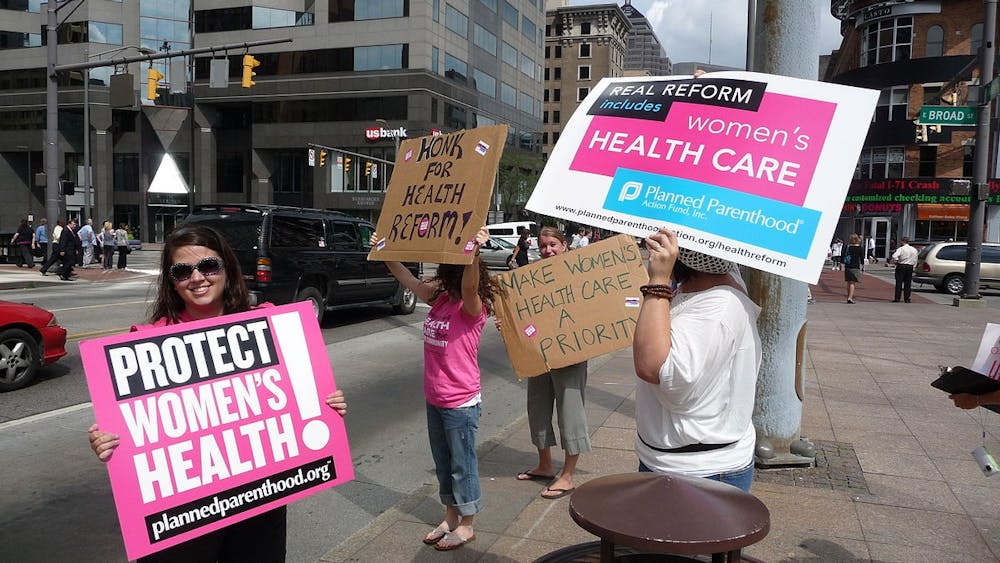Last month, the Senate confirmed President Donald Trump’s third and most recent appointee to the Supreme Court of the United States — Justice Amy Coney Barrett. Filling the seat of the late Justice Ruth Bader Ginsburg, Barrett could not be more of a staunch opposite of her predecessor. On the most divisive issues, Ginsburg and Barrett fall on polar ends of the spectrum of judicial philosophy.
Recently confirmed, Barrett’s constitutional originalism threatens the livelihoods for a multitude of marginalized groups. From her potential support for the overturn of Obergefell v. Hodges — the landmark case that legalized same-sex marriage on the federal level — to previous efforts to deny immigrants in the U.S. access to public assistance, Barrett has shown countless times that her interpretation of the U.S. Consitution is an exclusive one that halts social progress. These overly traditionalist views extend to her perspective on access to reproductive health care. In the face of Barrett’s confirmation, it is essential for those who benefit from birth control to make sure their method is up-to-date.
If you’re considering going on birth control, now is the time to meet with your healthcare provider and discuss your options. Soon, access to both contraceptives and abortions may become severlely limited.
Already, many pro-choice advocates have vocally expressed their concerns for the potential overturn of Roe v. Wade. Some have questioned whether this is the “end of abortion” and an end to our right to a safe and legal pathway to this procedure. Even if Democrats keep the House in the quickly approaching election, a conservative-majority Supreme Court could strike down any policy that would support access to these procedures — but Barrett may pose a unique threat. Not only has she advocated for anti-abortion causes in her personal life, but these values have been reflected in her judicial work as well. She was a clerk for the late Justice Antonin Scalia, who was adamantly opposed to Roe’s decision. Further, while she has not ruled on any cases regarding the right to an abortion, some of her case history on similar issues illustrates an opposition to abortion access. For example, she voted to rehear an Indiana law about abortion accessibility for people under the age of 18 and voted to rehear a case that struck down a law that would require the creamation or burial of fetal remains. For years, President Donald Trump has promised that Roe v. Wade would be overturned. It is only logical to think that he would only appoint a justice that he believes would uphold this pledge.
During her Senate hearings, Barrett did not directly respond to concerns that she would overturn this landmark decision — however, it is customary for appointees to refuse to offer decisions on hypothetical cases. Nevertheless, unlike other landmark cases such as Brown v. Board of Education and Marbury v. Madison, Barrett does not consider Roe to be a “super precedent” — signaling her willingness to limit the decision’s scope or even overturn its legal legitimacy.
For any person who can get pregnant, an abortion is the last line of defense in family planning. Nobody wants to get an abortion — individuals seek out the procedure when it is the only remaining choice. That’s why access to contraception is important. But that access is on the chopping block, too. The conservative majority’s effect on abortion rights are not the only concern — Barrett and the conservative majority’s views on healthcare and access to contraceptives are also concerning.
Soon after Election Day, the Supreme Court will hear California v. Texas, a decision which could potentially repeal the Affordable Care Act. The ACA has brought health insurance to millions of previously uninsured Americans, and it guarantees coverage for birth control. This repeal would put up financial barriers to birth control access for millions of people — and college students and young adults may no longer be insured on their parents’ accounts. The ACA requires that parents’ health insurance covers dependents up until the age of 26. Without this requirement, young people would be forced to finance their own birth control methods, making it more difficult to access them during the most fertile time in one’s life.
Without access to safe and legal forms of contraception, the number of abortions will not decrease — instead, the number of unsafe abortions will increase. Despite the ethical faults of Barrett’s confirmation process, the lifetime appointment of Supreme Court justices now places a burden on people who wish to take advantage of birth control. It may be years before the Supreme Court shifts to support reproductive autonomy. Despite the vague potential that a President Joe Biden would work to pack the Supreme Court, the right to choose is still very much up in the air.
While access to contraception exists in its currency capacity, now is the time to get an IUD. Or an arm implant — just anything that could potentially outlive the current conservative-backed theft of reproductive autonomy. The future of reproductive rights and access to birth control is bleak, and our health is at stake here. We must be proactive. Unfortunately, we must protect ourselves from the government forcing an unwanted pregnancy on our own bodies.
Learn about your birth control options here.
Victoria McKelvey is the Executive Editor for The Cavalier Daily. She can be reached at v.mckelvey@cavalierdaily.com.
The opinions expressed in this column are not necessarily those of The Cavalier Daily. Columns represent the views of the authors alone.







